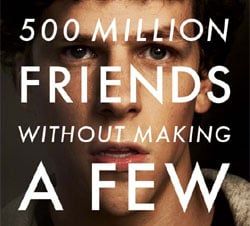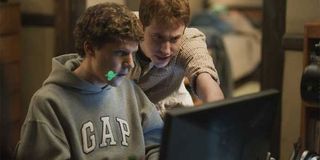Why Facebook And Mark Zuckerberg Should Like The Social Network

The Social Network doesn't hit theaters until this Friday and already it's been widely praised not just as the best movie of the year, but as perhaps one of the most defining movies of our era. The David Fincher directed film currently has a stunning 100% fresh rating on Rotten Tomatoes, it's a shoo-in for a couple of Oscar nominations, and it's being embraced by nearly everyone. Everyone that is, except the people running Facebook.
The movie is about the creation of the social networking site which began in a kid's college dorm room as The Facebook and has since gone on to become a part of the daily life of billions. More specifically it's the story of Facebook creator Mark Zuckerberg who, now 26, is the youngest self-made billionaire in the world. But Zuckerberg and his company aren't exactly happy with the movie. They wanted changes made to the script before it was produced, and since those didn't happen, they're now attempting to ignore the movie in the hope that it will simply go away. They've even gone so far as to block The Social Network from advertising on Facebook.
Mark Zuckerberg, as portrayed in the film by Jesse Eisenberg, is a socially awkward nerd who steps on more than a few toes on his way to success. At best he's an anti-hero who doesn't get girls or have friends or seem to understand the basic formalities of human interaction. Everyone who sees the movie sees something different in Zuckerberg, and what they see is almost never entirely positive.
In his review our own Eric Eisenberg describes Zuckerberg as an awkward kid so desperate for success and so jealous of those who have it, that he'll do anything to get people to like him. Others have described the character as obnoxious, petulant, dishonest, cold, distant, and mal-adjusted. It's easy to understand why Facebook might be hesitant to put a stamp of approval on a movie which portrays its founder in an apparently negative light, but they're wrong.
The Social Network is a movie Facebook should get behind. This should be a story they want to see told. It's easy to focus on Zuckerberg's failings but there's far more to the man portrayed on screen than a bad attitude. Look a little deeper and you'll see something that both Facebook and Zuckerberg should stand up and embrace. Here's a few reasons why.

Mark Zuckerberg Is Brilliant And Sympathetic
I imagine a bunch of Facebook lawyers sitting in a movie theater with legal pads making check marks every time Jesse Eisenberg, as Zuckerberg, does something people might not like. They'll fill up those legal pads pretty quickly. It's no secret that Facebook's rise came with a price. The story of The Social Network is built around two lawsuits brought against Zuckerberg and the company by friends and old partners Mark curbed on his way to success. His character is sometimes cruel and spiteful, it's true. But he's also portrayed as a bonafide genius, a guy with a billion dollar idea who refuses to waver in his determination to bring that idea to life. Mark Zuckerberg is an American success story, a kid who succeeds in remaking the world purely with brains, drive and determination. Zuckerberg does some pretty twisted things on the road to internet mastery, but they're never done in the service of greed or any sort of lust for money and power. What he does, right or wrong, he does in service of his dream. There's something to admire there.
CINEMABLEND NEWSLETTER
Your Daily Blend of Entertainment News
Yet the character presented on screen isn't charismatic or charming or in any way the kind of guy you'd want to hang out with. He's socially awkward and complicated and real. In one of the film's early scenes Mark's about to be ex-girlfriend tells him, “you're going to go through life thinking that girls don't like you because you're a geek. And I want you to know, from the bottom of my heart, that that won't be true. It'll be because you're an asshole.” She's right, Mark is an asshole, but not by choice. He's not evil, he's simply not good with people. He can't help it, it's just who is. When he offends or hurts, it's tempered by the knowledge that a lot of the time Mark doesn't really understand that what he's doing is hurtful. When he does realize he's damaged someone, he regrets it, and in his own way he cares. Mark Zuckerberg is a person who very deeply wants to be accepted by others, but like so many awkward people simply lacks the natural social sense to fit in with the crowd. In the end, long after he's consumed by the pursuit of his Facebook dream, Mark still hungers for acceptance he knows he'll never have.

The Social Network Doesn't Take Sides
Aaron Sorkin's Social Network script isn't interested in who's right or wrong. Though much of the movie is wrapped around legal battles between parties suing Facebook for real or imagined wrongs, it never really lays blame. At worst the screenplay lives in a sort of gray area where it's easy to see everyone's point of view. Were the Winklevoss twins right to sue? Probably. Was Zuckerberg right to do what he did to them? That answer to that is probably yes too.
Along the way to creating a social revolution Zuckerberg hurts a lot of people, even screws over his best friend. But The Social Network leaves you with the distinct impression that, had he not made those apparently harsh choices, Facebook wouldn't exist. They're decisions that more often than not spawn from a refusal to accept mediocrity, rather than out of any sort of real malice. Zuckerberg rages against those who oppose him, observing correctly that none of them could have done what he did. “They're suing me because for the first time in their lives, things didn't work out the way they were supposed to for them,” he notes in the midst of one of his legal battles. It's a statement that makes him as petty and arrogant as the people he's railing against, but that doesn't mean it isn't true.
Does The Social Network portray Zuckerberg as someone who hurt people on his way to the top? Yes, but that doesn't mean Zuckerberg wasn't also right. There's plenty of room for ambiguity and while I'm sure Facebook's corporate goons would prefer some sort of puff piece, what they've got instead is a fair minded, almost certain to be Oscar nominated movie which avoids the easy route of lining up against them in favor of a complicated story about the way their business may be on the verge of redefining the modern age.

This Movie Is Bigger Than Facebook
In the process of laying out the social site's genesis director David Fincher's movie also manages to, more clearly than any movie ever has before, define the modern era. The Social Network is bigger than Mark Zuckerberg and bigger than Facebook, a movie about who we are as people, the way we're all connected together more closely than ever before and yet still so incredibly distant from one another. That Facebook itself should be such a pivotal part of this, that it should be portrayed as being at the very center of what is, for better or worse, a kind of social revolution, that's the sort of advertising you just can't buy.
Whether The Social Network paints the company's founder in a negative or positive light seems almost irrelevant in the face of something so significant. What it does in the process of telling a much bigger story, what it does in the process of being about something bigger than the website itself, is make Facebook seem incredibly important. Anyone who isn't already on Facebook absolutely will be after they see this movie. They'll have to be. Fincher has made this one website the center of our cultural universe, the defining achievement of a generation. Whether or not that's true is immaterial, whether or not that's good for us doesn't matter, because The Social Network makes being a part of Facebook seem crucial and important. If you're not on Facebook, you're not connected.
For Facebook and Zuckerberg, there's really nothing to fear here. At worst this is a movie which shows the company's founder as an unlikely underdog screwing over a lot of rich people who, let's face it, in this economy most Americans don't have all that much sympathy for anyway. The Social Network is a new kind of strange, David and Goliath story with Zuckerberg as a tragic hero fighting battles not just against the society elite who shun him but against himself, and his own inability to connect with others. Unable to go out in the world and make human connections, Zuckerberg instead created a place which brings the world in and forces it to connect to him, through sheer force of will.
For Facebook there's more here to celebrate than to fear. For Zuckerberg, he's the key figure in one of the best movies of the year. Embrace it and take a seat next to David Fincher at the Oscars. You'll be accepted, awkward warts and all, Mark.
Most Popular





